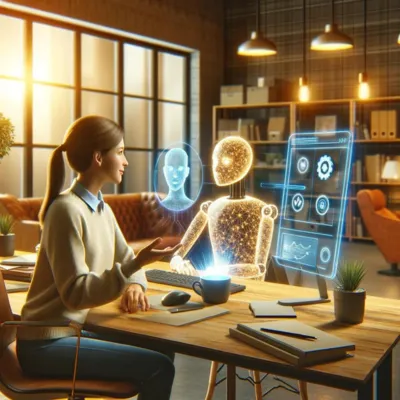Blog

Embracing AI: How Technology Enhances Human Capabilities, Not Replaces Them
“As we continue to navigate this shared landscape, the goal should be to leverage AI's capabilities to create a more dynamic, skilled, and fulfilled workforce”
In an era where technology advances at an unprecedented pace, it's natural to harbor concerns about the impact of artificial intelligence (AI) on employment. The fear that AI might replace human jobs is a common theme in discussions around workplace automation. However, a closer look reveals a different story—one where AI is not a job terminator but a catalyst for human growth, skill enhancement, and new opportunities. Let's delve into how AI, particularly AI phone agents, are augmenting human capabilities rather than replacing them.
Understanding AI as a Collaborative Force
AI should be viewed not as a competitor but as a collaborator that frees humans from mundane tasks, allowing them to focus on more complex, creative, and strategic activities. AI excels at processing vast amounts of data quickly, performing repetitive tasks, and managing time-consuming administrative duties. By taking on these roles, AI enables humans to dedicate their time to engaging in work that requires emotional intelligence, critical thinking, and personal touch—qualities that are uniquely human.
Enhancing Skills with AI
One of the most significant benefits of AI in the workplace is its role in skill enhancement. AI tools provide employees with real-time data and analytics, enabling them to make informed decisions faster and with greater accuracy. For example, in sectors like customer service, AI phone agents can handle routine inquiries such as appointment scheduling or basic troubleshooting. This arrangement allows human agents to tackle more complex customer issues, enhancing their problem-solving skills and deepening their professional expertise.
Moreover, working alongside AI encourages employees to develop new skills such as programming, machine learning maintenance, and AI supervision. These skills are highly valued in the modern job market and can lead to career advancement and new job opportunities.
Teaching New Skills Through AI
AI technologies also play a pivotal role in education and training. AI-driven programs can adapt to individual learning paces, provide personalized feedback, and highlight areas needing improvement. In the context of AI phone agents, employees can learn from AI's interactions with customers, gaining insights into customer behavior and preferences, which can refine their approach to service.
AI Phone Agents: Companions, Not Competitors
Consider the role of AI phone agents in industries like real estate or healthcare. These agents can manage a high volume of routine calls, from scheduling to handling basic inquiries. This capability doesn't replace human workers; rather, it supports them by allowing them to focus on interactions that require empathy, judgment, and negotiation—skills that AI is far from mastering.
Compassionate AI Integration
As we integrate AI into our workplaces, it's crucial to do so with compassion and a strategic approach that considers human welfare. This involves retraining programs that help employees transition into new roles facilitated by AI, as well as policies that prioritize human well-being alongside technological advancement.
Conclusion
AI is not here to take away jobs but to work alongside us, making our jobs easier and more impactful. By automating routine tasks, AI allows us to focus on areas that require human insight and creativity. In doing so, AI not only enhances our skills but also teaches us new ones, preparing us for the future. As we continue to navigate this shared landscape, the goal should be to leverage AI's capabilities to create a more dynamic, skilled, and fulfilled workforce.
Let's approach AI as an opportunity to grow and transform our professional lives, embracing the technology with an open mind and a strategic plan for integration that benefits everyone. By doing so, we can turn the tide of fear into a wave of opportunity, paving the way for a future where humans and AI collaborate seamlessly to achieve more than ever before.
Request a Demo
|Let Us Show You
Call (833) 722-0777
Email: [email protected]

